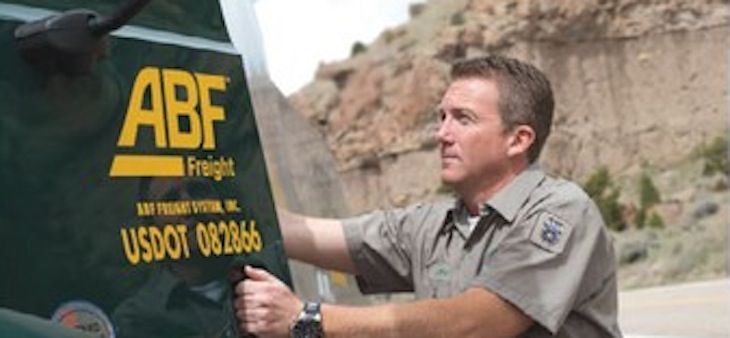Report: New union contract may leave ABF Freight in ‘market share losing position’
by April 16, 2018 7:20 pm 9,890 views

The first independent analysis of the proposed five-year labor contract between Fort Smith-based ABF Freight and the Teamsters suggests the union negotiators won the day.
An April 13 investor note from Little Rock-based Stephens Inc. concludes that the agreement favors the Teamsters “more than what we previously expected.” As a result, Stephens analyst Brad Delco and associate Scott Schoenhaus lowered ArcBest’s share price (NASDAQ: ARCB) target from $37 to $31.
ArcBest is the parent company of ABF Freight, which is one of the nation’s largest less-than-truckload carriers. The number of ABF employees who are union members ranges between 8,400 and 8,600. ArcBest employs around 13,000.
The International Brotherhood of Teamsters announced March 28 that a new contract was ready for approval. Prior to a new deal, Teamsters’ leaders said they were not going to approve a “concessionary” contract like that approved in 2013. The 2013 contract was negotiated in a much different economic environment. ArcBest was in the midst of more than $16 million in losses thanks to a freight recession that followed the Great Recession. Also, a precedent for wage concessions was set when the Teamsters provided wage and benefit reductions for then-struggling YRC.
Heading into 2018, the trucking and logistics industry is poised to have a solid year thanks to numerous factors resulting in more freight demand than freight-handling supply. Changes in the federal tax code are also expected to improve margins for companies like ABF. And ArcBest has been in the black the past few years. Full year net income totaled $35.57 million in 2017, $24.3 million in 2016, and $44.854 million in 2015.
THE NEW DEAL
Labor leaders approved the deal on April 13, and ballots will be mailed to members on April 19. Votes are due May 8 and will be counted May 10, according to the union. If approved, the contract would run to June 30, 2023.
Following are key points of the contract according to Stephens and Teamsters information.
• Drivers will see a 30 cent per hour wage increase in 2018 (effective July), 35 cents per hour in 2019, 40 cents in 2020, 45 cents in 2021 and 50 cents in 2022.
• Dock workers will be paid $16.25 per hour in 2018, $16.50 in 2019, $16.75 in 2020, $17 in 2021 and $17.25 in 2022.
• Full-time employees will receive a one time $1,000 bonus (pre tax), and “casual” employees who have worked at least 300 hours between Sept. 1, 2017 and March 30, 2018 will receive a $500 bonus.
• Pension contributions and health care plans will be maintained under provisions set in the previous contract.
• Restoration of six weeks vacation based on eligibility and years of service.
• Adds protections to union members from use of purchased transportation (outsourcing).
• Contains additional contractual benefits in areas of equipment standards and family and medical leave policies.
“We believe this tentative agreement improves the lives of our ABF members and their families while also making sure the company remains competitive so that our ABF members keep their jobs – the best jobs in the freight industry. Despite the many challenges we faced in negotiations, our committee remained united and focused and got the job done for our more than 8,000 members at ABF,” Ernie Soehl, director of the Teamsters National Freight Division and co-chair of the Teamsters National Freight Industry Negotiating Committee (TNFINC), said in a statement.
ArcBest officials did not respond to questions from Talk Business & Politics about the Stephens’ assessment of the contract. Following is part of a statement the company posted April 13.
“At the start of negotiations, ABF said our goal was to reach an agreement that was fair to employees and affordable for the company. Ratification of this beneficial agreement for both parties will allow ABF to continue serving our customers with the excellent experience they expect and provide additional opportunities for the company to grow. Employees will continue to have the best-compensated jobs in the industry. We encourage our employees to vote ‘Yes.’”
COST DISADVANTAGE FOR ABF
In the investor note, Delco and Schoenhaus said they “were surprised that ABF Freight was unable to secure any concessions from the Teamsters in regards to its initial requests (i.e. no wage increases, no bonuses, and pension cuts per the conference call).”
The two analysts estimate the contract, if approved in its negotiated terms, will result in a $150 million to $200 million annual cost disadvantage for ABF Freight compared to its competitors.
“Said another way, we don’t believe terms of this tentative agreement will help (ArcBest) move its cost structure inline with its competitors and will likely keep ABF Freight in a market share losing position for the life of this contract,” Delco and Schoenhaus wrote.
The competitive disadvantage was noted by the Teamsters, with union leaders saying they were challenged to seek more for union members while also not jeopardizing the financial health of ABF Freight.
“Here is the challenge TNFINC faced with ABF: To obtain as much as possible for the members without leaving the company so uncompetitive that it would be doomed. It would make no sense to squeeze so hard that it left the company on death’s door so that catastrophic cuts would be needed in short order to keep it alive,” the union noted on its website. “So that was the environment facing TNFINC in negotiating with ABF. TNFINC needed to be tough in bargaining but not overplay its hand and place the decent jobs and quality benefits of 8,400 Teamster families at risk. The entire union Negotiating Committee supported the strategy.”
